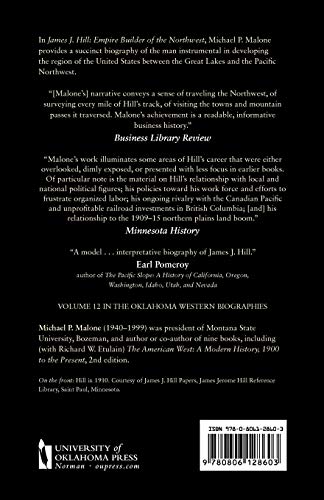Customer Services
Copyright © 2025 Desertcart Holdings Limited




James J. Hill: Empire Builder of the Northwest (Volume 12) (The Oklahoma Western Biographies)
P**G
Most interesting!
I enjoyed every minute of it!
T**F
Complete history
Good historical reading of Hill's entry into thr railroad business and his continued work on the development of the Great Northern.
P**N
but I did enjoy reading it
I'm not a historian, so I don't know how to critique this book from that view, but I did enjoy reading it, and regard it as a worthy addition to my view of American history.
J**S
A lovely and thorough treatise oh how the barons of ...
A lovely and thorough treatise oh how the barons of old devoted their energies to build the infra structure of this nation
H**8
Four Stars
Good history
J**N
Good detailed info
The information presented was very interesting, even inspiring. It was presented in adequate, but not too much, detail. I now understand what he did, and how he accomplished it.
J**D
Empire builder
Top notch book. Tghat is all that I have to say about this book. I read it straight trough. thanks
J**Y
An interesting biography of a business genius
«The wealth of the country, its capital, its credit, must be saved from the predatory poor as well as the predatory rich, but above all from the predatory politician» - James J. Hill.In her 1962 lecture, «America's Persecuted Minority : Big Business», Ayn Rand distinguished two types of entrepreneurs, whom Burton Folsom Jr. was later to label «economic» and «political»: «self-made men who earned their fortunes by personal ability, by free trade on a free market» and «men with political pull, who made fortunes by means of special privileges granted to them by the government.» And according to her, James Jerome Hill was an arch-representative of the former group, because he built his transcontinental railroad, the Great Northern, «without any federal help whatever.»Michael P. Malone's admiration for Hill, on the other hand, is much more moderate (and for those who think such moderation unjust, he is kind enough to direct us to Albro Martin's «highly laudatory» two-volume biography of Hill, *James J. Hill and the Opening of the Northwest*)For instance, he puts the phrase «self-made man» in quotation marks when applying it to Hill, for, he says, Hill's fortune «sprout... from the rich seedbed of federal subsidy»: by completing his first large scale project in time (the Manitoba railroad), Hill managed to reap the «seventh largest of the original seventy-five railroad grants», located mostly in the fertile Red River valley. Therefore, Malone says, we should forget the «hoariest, and most mischievous, of all the many legends surrounding Hill»- the one perpetrated by Ayn Rand and, after her, Burton Folsom Jr.- which «rhapsodizes about how he built a great transcontinental line without the benefit of a federal land grant.»Was Hill therefore just another political entrepreneur? I don't think so.First, Malone here seems to be conflating federal subsidies and land grants. A federal subsidy, in my understanding, is a transfer of money or produced goods, which by its very essence involves a forced redistribution and is therefore immoral. A land grant, on the other hand, consists in the granting of a non-improved natural resource to its actual developer, in a good approximation of the Lockean ideal of acquisition through labour. What makes it a form of «federal aid» is only the government's assumption of the power to acquire land by some non-Lockean process (i.e. by fiat, or in this case, purchase from another government that had acquired the land by fiat.)Second, the lands granted to the railroads actually owed most of their value to the building of the roads. As Clarence Carson explains in *Throttling the Railroads* : «the lands granted [however fertile] were worth little to nothing on the market at the time they were granted.» This was so because cultivating those lands would have been economically hopeless without the cheap transportation to population centers provided by the railroads.And third, Malone's metaphor makes it sound as though Hill's fortune merely grew out of the «soil» of federal subsidy by some natural, automatic process or, to mix metaphors, a snowball effect. Actually, the building of the Manitoba railroad is only chapter 2 of the biography, and there are 6 more chapters to go in which Malone himself offers ample illustration that the building of Great Northern and the rest of Hill's achievements did not simply «sprout» from the government's bounty.Whatever the motivations for Malone's very mixed final estimate of Hill, he does grant his subject a certain number of admirable character traits, which confirm Edwin Locke's conclusions in *The Prime Movers*. For instance, Malone singles out the following as Hill's distinctive traits in chapter 4: «his remarkable mastery over every detail of what was now a far-flung operation, his vision of the inevitable triumph of transcontinental through-carriers [together forming Locke's virtue of «independent vision»], his insufferable [Malone again...] iron will and work ethic [Locke's «drive to action»], and his recruitment of an able coterie of men [Locke's «love of ability in others»].» And this is only Malone himself trying to summarize Hill's virtues : the book offers much more concrete material for you to make your own identifications and corroborate Locke's analysis.The flaw of *Empire Builder of the Northwest*, in my opinion, is that it is merely interesting and informative where, given its subject, it could have been epic. Malone himself is no great enthusiast of economic freedom: at one point, he refers to «the simplistic bromides of laissez-faire». Moreover, the book only offers two maps, which makes following some of the descriptions rather difficult. However, if you do not have the time for Albro Martin's longer work and are frustrated by the mere 22 pages in Folsom's *The Myth of the Robber Barons*, Malone's book remains a good introduction to the life of an immensely productive and hardworking man, who was also a voracious reader, a faithful husband and- as the opening quote reveals- a «true believer in the virtues of unfettered capitalism».
Trustpilot
2 weeks ago
2 months ago
2 days ago
1 month ago